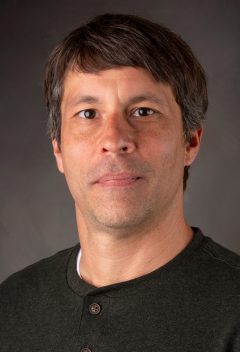This column by Lecturer Greg Hlavaty was published by the Charlotte Observer, Raleigh News & Observer and Durham Herald-Sun on April 22 — Earth Day.
By Greg Hlavaty
When my family rented our home in Glencoe Mill Village, a historic neighborhood in Alamance County, North Carolina, we were charmed by the restored 19th-century houses and adjacent river trails. The county park that abutted our new backyard lured us, but when we first tried to explore the woods, we found a mound of old farm trash: car parts, tin cans and bottles.

Surprisingly, my oldest son, Rowan, then 11, suggested we clear a path. Armed with mismatched garden gloves and five-gallon buckets, he and his seven-year-old brother, Sylvan, joined me in sorting trash from recycling. After several cleaning sessions, we had cleared a path.
Rusted metal no longer framed chickweed. Shoe bottoms and discarded pails no longer marred the leaf litter. My kids began exploring the woods. Sylvan, at times, stood alone out there to “get wisdom” and bring it back to share.
It felt like a parenting win until I stepped off the path and heard the leaves crunch, betraying the decades-long accumulation of trash. How deep did the trash go? Alone, I dug but found no bottom.
I did not betray to my children what I had discovered until one day Rowan, who had been worrying over environmental issues like climate change, asked, “Will we be done with this soon?”
I froze, knowing that on some level our conversation was not about the trash pile but about the possibility of continued action and hope when the odds seem insurmountable. As a parent, I wanted to promise the trash would be gone, but since I had dug deeper — literally — I answered: “These woods may never be clean, but it feels good to make things better, right?”
Rowan continued sorting trash, but I worried that my children would give into climate doom-ism, a popular mindset that finds it easier to surrender than to act. To become, in effect, paralyzed.
I drew inspiration from Wendell Berry, the American environmental activist and writer who has been slowly restoring an old farm in his native Kentucky. That effort required him to face his culture’s “destructive history” concerning the land.
In “The Making of a Marginal Farm,” Berry calls this history “a nearly insupportable burden,” a statement that likely now applies to all human action towards the planet. Luckily, Berry recommends “healing work” as a means to avoid hopeless inaction. Although Berry chose farming, he gave no prescription for healing work, but it seems to me that it should help you acknowledge your cultural past while improving the present.
Was my family engaged in healing work? Does cleaning one trash pile matter when faced with climate change? I can only say I felt less helpless, and in caring for one spot, I began looking outward. In that way, healing work is infectious.
As avid hikers, we frequented a trail that ended in a twisted length of rusted fencing and barbed wire, an obstruction that extended through a sycamore’s trunk and wound unpredictably towards the river. For two years, my family had negotiated this obstacle, but our work with the trash pile had taught me that we could remove it.
And more: if we did not fix the problem, no one else would.
One morning, I gathered some bolt cutters, gloves, a length of rope, a hammer, and the wheelbarrow. Though I had intended to work alone, my kids grabbed their gloves and joined. Working around the sycamore, Sylvan and I cut fencing while Rowan flattened protruding wires against the bark. When we had finished, I ran my palm around the sycamore to check for barbs. My hand slid freely over the grey bark, the fencing still visible but hammered flat. Rowan squatted, looking intently at the tree’s roots. I thought he was watching worms, but he was gathering small bits of broken fencing so no one would cut their feet.
As we left, I had to force the lesson: “Look how much better that looks! That wire has been there for years, and we took it out in an hour. Feels good, right?”
The kids quickly agreed, but they were already moving down the trail and onto their next game.
Weeks later, we were hiking by the river when Sylvan took his mother’s hand and said, “Want to see the barbed wire?”
He led her around the bend to the point. No metal now. All river, rock, trees.
“It’s all gone.” Sylvan pointed to the sycamore’s great grey trunk, its roots now free of wire and human trash. “Looks a lot better, doesn’t it?”
—
Views expressed in this column are the authors’ own and not necessarily those of Elon University.


